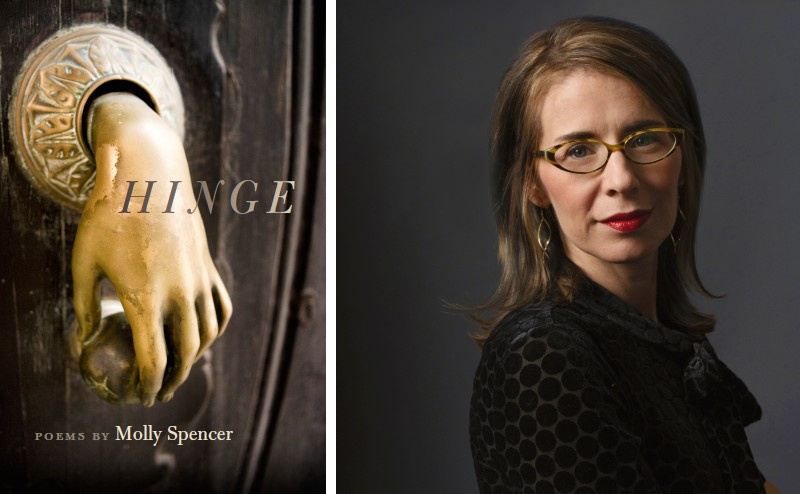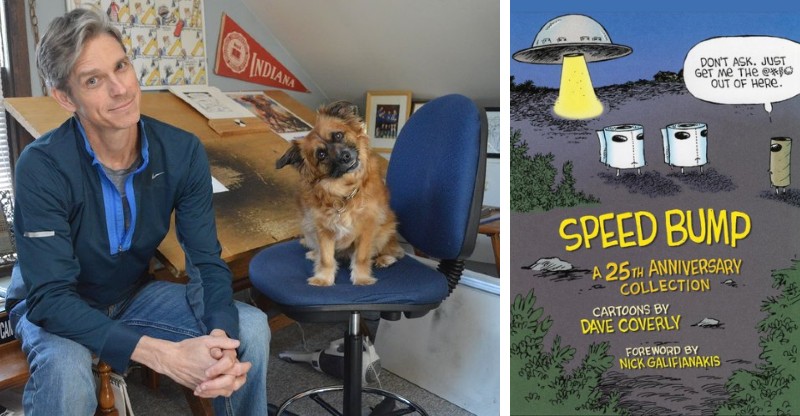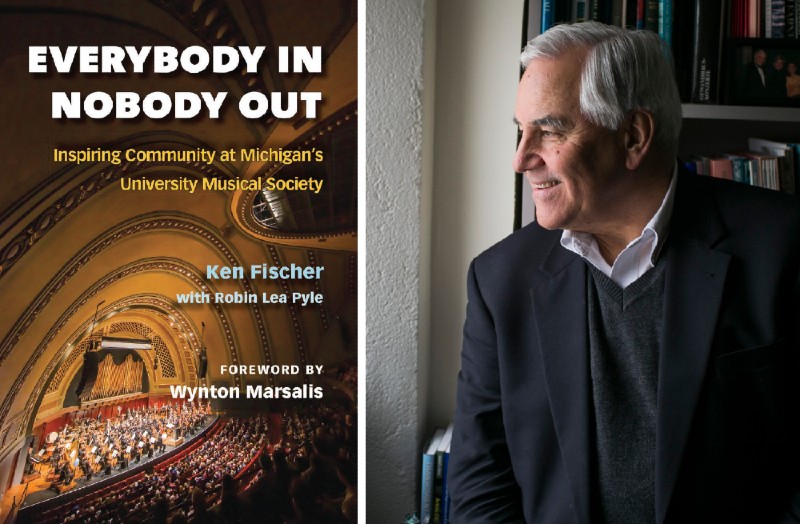Molly Spencer covers chronic illness, domestic life, and nature in her second poetry book, "Hinge"

Hinge by Molly Spencer shows a world in which the poet seeks to find footing in a constantly shifting landscape and body. Views, possessions, relationships, and physical capacity change and merge and vanish at various points. The multipart poem “Objects of Faith” reveals these different angles by looking at things like a window or a berry and distilling them to what they do: “To hold in place / once piece of the world” or “To be that ache / in someone’s mouth,” respectively. This instability and the feeling of being on the cusp of something appears through the changing seasons, motherhood, and domestic life.
This collection of poetry particularly examines chronic illness, its progression, and its effects. At times, the poet’s observations are stark:
In this family
of illness,
the doctor says,
the body
attacks itself.
The poet seems to consequently no longer trust the world to stay how it’s meant or desired to be. It’s as if everything has become more fragile and uncertain—the poem “Patient Years” tells us “safe is the shell of an egg.” The poet also asks the question “if the one you love / most will follow you down.”
Despite dark winter days, even darker dreams, and physical limitations in these poems, persistence is visible. The poem “Vernal” suggests hopefully that:
AADL 2020 STAFF PICKS: BOOKS, MUSIC, MOVIES & MORE

Normally, you might come into the library, talk to someone on staff, get some recommendations, perhaps share a few of your own, and we'd go on our merry ways, content we could engage in a positive social interaction while discussing whatever book, movie, TV show, music, or more that came up.
Art is life and life is people.
But we've not seen most of you since March 13, the last time the Ann Arbor District Library was fully open to the public—and to the staff. While many AADL staffers have returned to the buildings to do important behind-the-scenes work since the summer, many others have been working from home since the closure. And we miss being able to share what we're currently loving not just with patrons but also with each other.
So, to staffers and patrons alike, these are the movies, TV shows, music, books, and more that helped the AADL crew get through 2020.
Objects of Veneration: "Sacred Hands" and other online exhibits at the University of Michigan Library

Right: Parchment fragment. Verso. Book of Jeremiah. Sahidic Dialect. White Monastery, Sohag (Egypt), 10th century. Fragments of the same manuscript are kept in London, Manchester, Paris, and Vienna. The images of birds and fish are fairly common in these Coptic manuscripts as exemplified in the decoration accompanying the initial "T" on the left margin of this page. Parchment, 365 x 278 mm.
The introduction to Sacred Hands, a new online exhibit by the University of Michigan Library featuring ancient manuscripts for Judaism, Christianity, and Islam, sums up why objects of veneration such as these are important even if none of those religions apply to you:
It seems appropriate to use the term "sacred" to describe the hands that copied the manuscripts containing the texts of the three Abrahamic faiths: Judaism, Christianity, and Islam. However, the meaning of this word transcends the conventional limits of the religious sphere. "Sacred" can also designate what is unique, exclusive, and venerable.
Additionally, so much of our current social and philosophical climate is generated from these old texts that it's impossible to understand the present without studying the past.
2020 Ann Arbor Jewish Book Festival offers 25 authors over 20 days

I've increased my reading tenfold since the beginning of the pandemic.
Of course, most of that reading is doom scrolling on Twitter, but nevertheless, words were seen by my eyes.
But my desire to consume books hasn't waned even if my attention span has, and the 2020 Ann Arbor Jewish Book Festival (AAJBF) has provided a host of authors and titles to add to my unconquerable to-read list.
From December 2 to 22, the AAJBF will present 25 authors discussing 22 books, which is a lot more than usual for this 33-year-old festival. If there's any benefit to the whole world being on lockdown and Zoom calls becoming a part of our collective DNAs, it means festivals like this and others are able to schedule more authors (or performers, etc.) because they don't have to travel to the events in person. While the arts and culture side of the AAJBF will be muted this year because of the pandemic, there's now an increased chance to engage with a wide range of authors writing about Jewish subjects or that have Jewish connections—and most of the talks are free of charge.
Here's the calendar for the 2020 Ann Arbor Jewish Book Festival; click on the authors' names for event links on the AAJBF website:
Food, immigration, and female experience intertwine in poet Jihyun Yun's book "Some Are Always Hungry"

Some Are Always Hungry by Jihyun Yun concentrates not only on cuisine but also on the ways the world views, consumes, and treats womanhood—how women are made to push through and past very physical, personal challenges, and to try again. The attention to these topics is inseparable from history, trauma, and family, whether it’s on memories of immigration, the shame carried in female bodies, or the comfort of a meal made from bodies of animals.
These poems tie together generational and physical pain, recipes, and urges—the urges to survive, to procreate, to eat, to seek fullness. They read in the way that you may listen to someone talking with the leaps between thoughts that are colored in by context and word choice. One poem looks back on a moment:
Writing Through It: WCC Poetry Club releases the "Going Viral: Pandemic and Protest" anthology

During the past eight months, people have found different ways to cope with the pandemic and politics, from meditation to activism.
Other people, like me, like to punch a heavy bag covered in effigies of my enemies. (I can't remember what the kid looked like who roughed me up in fifth grade, but trust that his crudely drawn face is on there and I made him look like Jabba the Hut, mostly due to my terrible drawing abilities; sorry, dude.)
But the folks in Washtenaw Community College's poetry club turned to writing to process their feelings, and the group recently released its latest anthology.
Going Viral: Pandemic and Protest features work from WCC students, faculty, staff, and alumni, all written between April and September of this year. The 60-page ebook collection, edited by WCC professor Tom Zimmerman, is free and can be acquired as a digital version or as a PDF:
No Slowing Down: Ann Arbor cartoonist Dave Coverly celebrates the 25th anniversary of "Speed Bump"

The easy part of compiling a book that celebrates a comic strip’s silver anniversary is, well, you’ve got lots of options.
“I’ll get reviews and comments that say, ‘Not a clunker in the bunch!’—but, you know, I had 10,000 to choose from,” said Ann Arbor-based cartoon artist Dave Coverly, whose book Speed Bump: A 25th Anniversary Collection debuted in September. “If anyone wants to visit my house, you could see a big plastic tub of cartoons that are terrible.”
Perhaps that’s inevitable when your job’s required you to hatch and execute seven new ideas every week throughout two and a half decades. “You can’t wait for the muse to strike when you’re on deadline,” Coverly noted.
But having the National Cartoonists Society award your work with Best in Newspaper Panels (’95, ’03, ’14) in addition to its highest honor, the Reuben Award (’09), might suggest that you’re getting it right far more often than not.
And for Coverly, one of the most appealing things about a single-panel cartoon is its unfettered flexibility.
“I do a lot of cartoons that use aliens and animals, but they’re always really about people and the things we all have in common,” said Coverly. “My daughter, who’s a painter, had a professor who told her, ‘Don’t ask yourself what you’re going to paint. Ask yourself why you’re going to paint it.’ And I love that quote because I’m someone who—I don’t like jokes for the sake of jokes. … I’d rather try for something that’s driven by an idea. Something that’s more subtle.”
Alison Swan's poetry collection "A Fine Canopy" celebrates the natural world

The natural world and the built environment sometimes seem so enmeshed that the borders between them blur. We walk into the fluorescent lighting of a store and then back out into the day’s weather. We go to the beach and some sand trails, then back inside vehicles and homes.
Poet Alison Swan explores this complexity in the lives that we live both with nature and in our manmade world in her new collection, A Fine Canopy (Wayne State University Press). One poem called “Lake Effect” considers how the environment coexists and contends with human life:
[…] We don’t ask,
where’s the sea? We can walk to it,
and to acres of scrub, pasture, crop,
asphalt draining to it, and the reactor
it cools.
Signs of human change to the environment appear to be inescapable.
Yet, the splendor of the natural world heartily persists in Swan’s poems, and many lines admire this place where we reside, as the poem “Aubade” declares near the end of the collection:
It is good to […]
[…]
look out into
the lemon light of morning and
call it beautiful […]
Swan will read and be in conversation with poet and teaching artist Holly Wren Spaulding in a virtual event Tuesday, October 6, at 7 pm through Literati Bookstore. I interviewed Swan, a teacher at Western Michigan University, about ecopoetry, the Bentley Historical Library, and what she's reading.
Publisher Michelle Dotter details upcoming works from Ann Arbor's Dzanc Books

“If you had told me when I started in this business, that one day I would be working for a non-profit that published books based on their merit and not profit, I would not have believed it,” says Michelle Dotter, who serves as publisher and editor in chief of Dzanc Books (pronounced Duh-ZANK).
The nonprofit was co-founded in 2006 by Ann Arbor lawyer turned novelist and 826Michigan creator Steven Gillis and Emerging Writers Network creator Dan Wickett. They had an uncompromising vision for Dzanc.
“The biggest thing for Steve," Dotter says, "was that nothing be constrained by shareholder interest, so we would never sacrifice artistic quality or only support books that could make money … or end up like some presses, where commercial potential is such a factor they send book covers to retailers like Walmart or Costco, giving them the power to reject a cover if they think it won’t sell.”
Dotter took over as publisher and editor in chief of Dzanc in 2017 after working there since 2014.
“I loved what they were doing as far as experimental literature," she says, "taking chances on amazing authors and books that might have been rejected for commercial reasons at other publishers.”
One such book is In Our Midst by Nancy Jensen. Dotter will be in conversation with Jensen at a virtual event hosted by Literati on Monday, September 28 at 7 pm.
Ken Fischer makes the case for collaboration and connectivity in his book "Everybody In, Nobody Out"

This post contains two sections: a book review and a brief interview with Ken Fischer.
On June 1, 1987, Ken Fischer became the sixth president of the University Musical Society at the University of Michigan.
That date marks the beginning of 30 years of transformation, innovation, and collaboration.
Fischer’s Everybody In, Nobody Out: Inspiring Community at Michigan’s University Musical Society written with Robin Lea Pyle is a book of many parts. It is a memoir, an insider’s view of some of the leading performance artists who come each year to Ann Arbor and, perhaps most important, a guide on how to operate a non-profit by reaching out to and connecting with the community at large.
The title comes from Patrick Hayes, a mentor to Fischer and former head of the Washington Performing Arts Society. Hayes had developed a policy for art presentation that emphasized inclusion at every level. His policy was "Everybody In, Nobody Out" and it became Ken Fischer’s mantra.
“It was about making connections and forming partnerships for everyone’s enrichment,” Fischer writes. “The great thing about collaboration was that it could be the foundation of everything we needed to do as an organization: secure outside sources of funding, raise our visibility in the community, expand our audience, gain new insights, and build enthusiasm for working on new projects.”
Fischer’s book is a short history of those collaborations with the university, with world-class performers, with other local arts groups, and with local and national businesses and philanthropists.
But first a prelude.


































